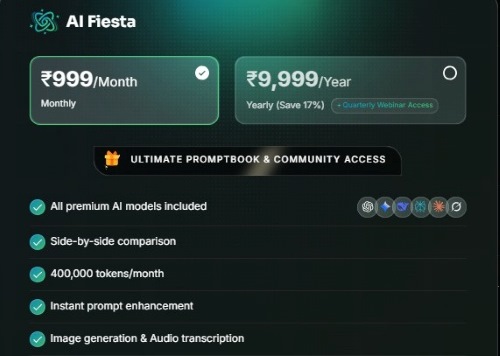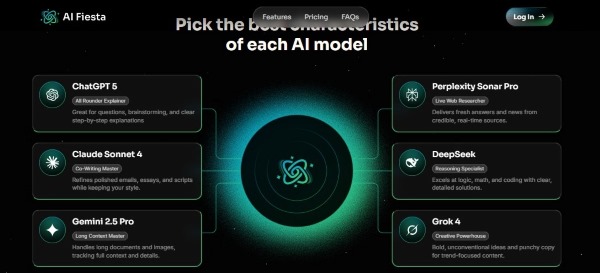Indian YouTuber Dhruv Rathee recently introduced his startup AI Fiesta. It is an aggregator platform promising affordable, unified access to top-tier AI models such as ChatGPT-5, Gemini 2.5 Pro, Claude Sonnet 4, Grok 4, DeepSeek, and Perplexity Sonar Pro. For a neatly packaged subscription of ₹999 per month (or ₹9,999 annually), users can supposedly save thousands compared to purchasing individual subscriptions of each of the AI models. While, this sounds like a potential game-changer for creators, professionals, and students alike, we would like to highlight multiple flaws that could undermine the platform’s value and trustworthiness. This article on AI Fiesta Review compiles and brings out the five most significant issues plaguing AI Fiesta and what they mean for users.
1. Restrictive Shared Token Limit
What’s the Problem?
AI Fiesta allocates only 400,000 tokens per month, shared across all integrated AI models—effectively placing a cap on the platform’s overall usability.
Why This Matters
Let’s put it in perspective:
Now, 1 token = 3/4th of a word of English text (so approx. 0.75 words)
So, 400,000 tokens in a month equals approximately 300,000 words in a month.
Next, a single query answered by 6 models (e.g., a 100-word response each) can consume approximately 500 tokens and writing a 1000 article would consume minimum 5,000 tokens.
This means the monthly limit can be exhausted in just a few queries—especially if users want in-depth research, long-form content, or interactive sessions. Critics argue that this severe restriction severely diminishes the apparent affordability of the service.
2. Suspicions Around Model Authenticity
What’s the Problem?
Several users reported inconsistencies with the identities of the claimed AI models. For instance, Shubh the Writer in his Medium article shares that when he asked directly, a model advertised as “ChatGPT-5” allegedly revealed itself to be GPT-4.
Why This Matters
This raises serious concerns about transparency and authenticity. Users expect premium versions of AI models—paying for them should guarantee state-of-the-art capabilities. If the platform delivers older or generic APIs instead, that’s misleading marketing, eroding trust and potentially violating expectations.
Also Read: Interesting Facts you Need to Know about Google Gemini, a ChatGPT Competitor
3. Security and Validation Vulnerabilities
What’s the Problem?
A security researcher uncovered multiple vulnerabilities in AI Fiesta, including:
- Slow or unreliable account verification
- Poor input validation, accepting malformed data (e.g., mixed arrays)
- A session handling bug enabling message sniping, allowing users to access others’ conversations
- UUID manipulation, reportedly enabling access to premium models without payment (Source: Medium).
Although the researcher noted that patches were released, these flaws highlight serious initial oversights.
Why This Matters
In any AI platform—especially one that handles private user data and subscription-based access—security must be paramount. Leakages of user conversations or unauthorized access to premium features are privacy nightmares and legal liabilities.
4. AI Fiesta Lacks Original Innovation; Looks Like a Repackaging
What’s the Problem?
Critics argue that AI Fiesta is nothing more than a “wrapper” around existing AI services—offering aggregation but not innovation. Many see it as a “weekend project” repackaged for profit
Why This Matters
In a competitive landscape with alternatives like t3.chat offering similar services (with potentially better terms), being labeled as unoriginal can damage AI Fiesta’s credibility and long-term appeal
5. AI Fiesta Review: Questionable Value for Serious or Professional Users
What’s the Problem?
While AI Fiesta is marketed as affordable and powerful, the combined impact of token caps, potential model downgrades, and comparable competitors raises doubts about its real value. Many reviewers dismissed it as overpriced and underpowered compared to alternatives like Perplexity Pro or direct subscriptions to premium AI services.
Why This Matters
For content creators, researchers, and professionals who rely on AI tools for productivity, reliability and depth matter more than affordability. If they can access better services directly or through competitors for similar prices—or even free—the suitability of AI Fiesta becomes highly questionable.
Summary Table: 5 Key Flaws in AI Fiesta
| Flaw # | Description | Impact |
| 1 | Shared 400k token cap | Limits usage; drains quickly |
| 2 | Misleading model authenticity | Undermines user trust |
| 3 | Security vulnerabilities | Exposes sensitive data |
| 4 | No genuine innovation | Weak differentiation |
| 5 | Low value for serious users | Compromises utility for professionals |
AI Fiesta launched with noble intentions—simplifying access to powerful AI tools within a reasonable price point. Its aggregator model, prompt book, and integrated features like prompt boosters, projects, and generative tools make the idea compelling. However, these five major flaws—token constraints, dubious authenticity, security issues, lack of originality, and limited practical value—pose significant risks to its success.
For casual users, AI Fiesta may still offer occasional utility. But power users—those needing consistent, high-fidelity, flexible AI access—might find it falls short. Whether Dhruv Rathee’s team can quickly address these issues and rebuild trust remains to be seen.
Ultimately, AI Fiesta’s fate likely hinges on its responsiveness to criticism, commitment to improvements, and ability to differentiate beyond being a convenient but potentially hollow aggregator.




